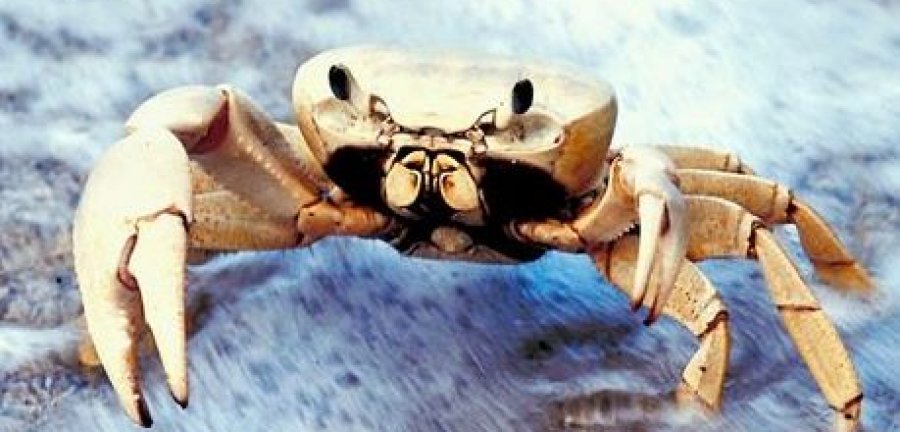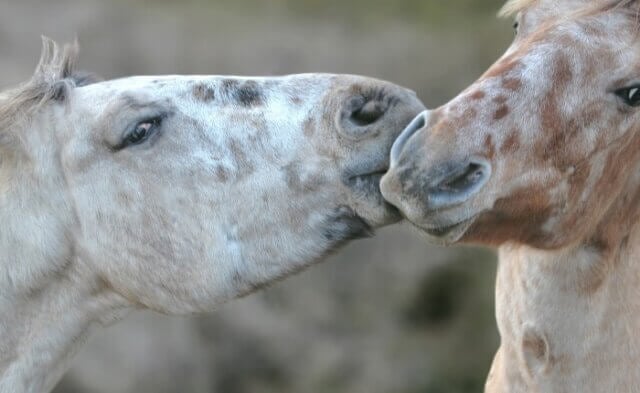Crustaceans are like us in many ways. Lobsters have a long childhood and an awkward adolescence, and just like us, they carry their young for nine months and can live to be more than 100 years old.
Like dolphins and many other animals, lobsters use complicated signals to explore their surroundings and establish social relationships. They take long-distance seasonal journeys and can cover 100 miles or more each year—assuming that they manage to avoid the millions of traps set along the coasts.
Scientists have found that two neighboring crabs will never fight each other and that if a male Australian fiddler crab’s burrow is being invaded, his male neighbor will leave his own burrow to help fight off the intruder.
Bromeliad crabs, who live in small pools of water in bromeliad flowers, provide their young with loving care. The mother crabs continue to feed and tend to their babies for several months after they’re born. S. Blair Hedges, a biologist who has researched the manner in which crabs care for their offspring, says, “The mother crab manipulates water quality by removing debris, by circulating the water to add oxygen to it, and by carrying empty snail shells into the water to buffer the pH levels and add calcium.”
Unfortunately, many sea animals—especially crustaceans—are treated as if they feel nothing at all. But PETA is making important breakthroughs in behalf of these misunderstood animals.
For example, despite the fact that many scientists and even some “seafood” authorities agree that lobsters and crabs feel pain, our recent undercover investigation of Linda Bean’s Maine Lobster slaughterhouse revealed that live, conscious lobsters and crabs are ripped apart limb from limb, live crabs are dumped into boiling water, and mutilated lobsters are left in bins to die in agony.
Our undercover footage can be seen at PETA.org/Lobster. This is a trailblazing investigation that will no doubt convince many consumers to keep crabs and lobsters off their plates. It’s also a historic inroad that we hope will change industry practices, too.
But the way they’re killed isn’t the only form of cruelty that lobsters endure. In grocery-store tanks, lobsters are piled on top of each other—with their claws bound with rubber bands—and forced to live amid their own waste. They are given no food and are often left to languish for days or weeks in filthy water with incorrect salinity and temperature levels. Many die before being sold.
In an effort to alleviate this suffering, PETA helped persuade Whole Foods Market—the largest natural-foods grocery chain in North America—to ban the sale of live lobsters and soft-shell crabs in all but one of its stores, at which strict standards were enacted. Additionally, after receiving thousands of calls and e-mails from PETA members and supporters, the grocery chain Raley’s declared that it would never sell any live lobsters again in any of its more than 130 stores.
PETA has also persuaded numerous restaurants to remove arcade-style games in which customers use a joystick-controlled claw to catch and “win” live lobsters.
In more good news, after hearing from PETA, Hershey Entertainment & Resorts has stopped selling hermit crabs in its amusement park gift stores, and numerous beach shops have stopped selling them as well. PETA has also persuaded several carnivals and festivals across the U.S. to stop giving away hermit crabs as prizes.
In their natural habitat, hermit crabs live in colonies of 100 or more. They lay their eggs only in the ocean and will not reproduce in captivity. That means that every single crab in every tourist shop and pet store condemned to a life of deprivation and loneliness inside a glass tank was taken from his or her home and family, not bred.
All animals deserve respect and compassion and that no animals should ever be dismembered, boiled alive, or stolen from their homes and kept as “pets” for people’s amusement.
What You Can Do
PETA is asking Linda Bean to switch to a less cruel means of slaughtering crustaceans, such as using electrical stunners. We tried meeting with her before releasing the results of our investigation, but our e-mails and calls were ignored. Please help us strengthen this push by contacting Linda Bean at [email protected] or 207-975-2502 and politely requesting that she and her company use commercial electrical stunners that can eliminate the ripping apart of live lobsters—who can survive for hours afterward in agony—as well as the mutilating and boiling to death of live crabs.
This article was originally printed in PETA’s Augustus Club newsletter. PETA’s Augustus Club is a complimentary club honoring those who are leaving a legacy for animals through a planned gift to PETA. There are no fees or charges, and members receive quarterly newsletters containing special features on PETA’s history, PETA’s impact on animal-abusing industries, and profiles of members and animals they’ve saved. Augustus Club members also receive invitations to special events throughout the year. Augustus’ noble image, dignity, and innocence make him a fitting symbol of the plight of all animals who have endured—and are still enduring—callous and horrible treatment at the hands of humans.
If you have made a planned gift to PETA, please let us know so that we can thank you! If you have not yet left a legacy for animals but would like information on how to do so, please contact us.





